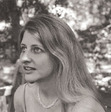Tricia Sullivan's Blog, page 5
August 4, 2013
Åcon 6 Part Two: A Sprawl of Belated Goodnesses
Science fiction and sciencey people in one place
I loved that there were so many scientists in a room talking about science fiction and despite being freakishly smart they were generally so not-wedded to what I’ll call the Benford definition of hard SF. Not once did I see anyone wield their STEM PhD so as to put the fantastically-minded people in their place. This is all I really need from life in the genre.
I don't know if people on the inside quite realise how scary SF is for a lot of people. I was just at Edge-Lit and a couple of newer writers were talking about growing up reading SF but not having the nerve to write it because they hadn’t the science chops. The school of SF that says it’s gotta at least make the right scientific noises to be SF, I know this has subconsciously fucked with my head for many, many years. I’ve never tried to make my SF Benford-hard. But I’ve certainly warned myself off whole areas because I knew I’d be punished for ‘getting it wrong’. Not one whiff of that at Åcon--although I certainly heard people critically examining work that they were reading.
You don’t realise how smelly and stale the air in your milieu has become until you get a breath of the fresh stuff. Ahhhh!
The ferries
I was a little worried about the ferry trip. Last time I took a ferry (from Holyhead to Ireland in 1987) I spent half the night puking over the railing. This was sooooo different.
Here is a photo of Sean and his new best friend Hermann from the ferry. Hermann introduced Sean to the concept of a tablet. Life has never been the same since.
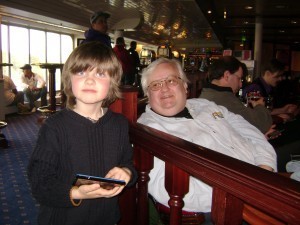
The ferries are the greatest thing ever! We cruised across the Baltic in the most chilled-out fashion. If all travel were like this I’d become permanently itinerant.
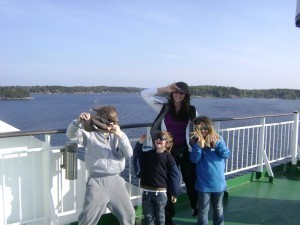
Karin Tidbeck OMG
At the convention we watched a short film of Karin Tidbeck’s story ‘Who is Arvid Pekon?’ from her collection Jagannath . During the discussion Cheryl Morgan read a tidbit from the story itself, which had a very different feel to the film. I was unable to appreciate all of the points being made on the panel because I hadn’t read the collection at the time. I have rectified that and can say that not only are the stories superb (all good, three of them absolute standouts for me) but as interesting as the film was, it did not do justice to the story. Genius.
Karin will be at Fantasticon in September as a guest and I am going to fangirl on her, I'm afraid.
Blue skies, blue birds, blue men, blue mesons
It is funny that a country generally associated with cold is not only sunny, but inhabited by people who are so genuinely kind and welcoming. I did not know anything about Finnish hospitality before I got there, but apparently it is legendary and I can see why. I felt that I was around a group of people who were sensitive, caring, thoughtful and often very funny, and they were going out of their way to look after me and make me feel at home. I really was making a lot of noises to Steve on the way home about how could we send the kids to University there? Wouldn’t it be great for them? And stuff like that. I did not want to leave. If I didn’t have such a bad reaction to dark winter nights in the UK, I’d have been plotting and scheming to move.
So if you can vote for Worldcon in Helsinki, I must beg you to do so and if you can’t, I hope you’ll consider telling your friends who can. If the committee can win this bid they will put on a megatron of a Worldcon, I’m certain of this.
I had no idea when we left for the trip that Angry Birds originates in Finland. I have never played it, but my seven-year-old son Sean has recently developed an obsession. Here he is using the elastic that holds the bed together in our ferry cabin as a launch catapult for Blue Bird in an attack on Darth Pig.
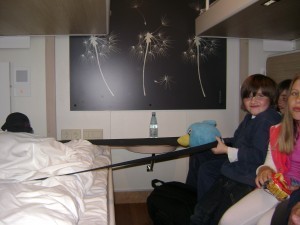
When Sean learned that Tommi Markus actually works on the game, he was shocked and awed. Tommi even gave Sean his business card! The rapture! Sean is busy working on suggestions for what should happen next in Angry Birds (last I heard he wanted an Ice Age Angry Birds). So far I have managed to restrain him from rining Tommi up, but I don't know how long I can hold him off!
Until this happened I don’t think Sean quite realised that these games are developed BY PEOPLE. For me, it was exciting to think about the fact that so much creativity goes into a global phenomenon like this, and in the case of Angry Birds the company is not some monolithic entity like Disney, but a group of people working together creatively. I found this all so optimistic—and that’s the feeling I got in general about Finland. Optimism. The future. Blue sky.
Speaking of blue…there is a tradition at Åcon to find a willing young man and paint his entire body for fun; this year he was blue. Photographer Henry Söderlund was recruited for the role, and aside from having been painted blue, he has an ongoing project to photograph people in goggles. This is where my new userpic comes from, and you can see a great many of the Finnish fandom suspects on the Facebook community Everything is Better With Goggles. Henry and artist Ninni Aalto have a rabbit who resembles Schoepenhauer who also has his own Facebook page. Ninni is working on a children’s animation project collaboration with a physicist in which she is creating characters based on subatomic particles. Finnish children are so lucky! We get Teletubbies, they get bosons and gluons.
There’s lots I’m leaving out, but I’ll close this imperfect post with a shout out to the Science Fiction Book Shop in Stockholm which is a wonderful place run by an SF reader and writer. They were kind enough to offer me a signing. In return my kids bought a ton of stuff.
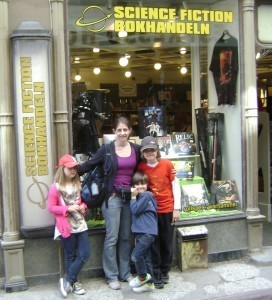
Finally, I would like to say a very big thank you to Johan Anglemark for sorting out everything about the trip and generally looking after us, to Hanna Hakkarainen and Marianna Leikomaa and Karolina Leikomaa for running the show and to EVERYBODY who hosted me and my family and spent time with us. It was a huge pleasure and one I won't soon forget.
And that is it from me, for now. I am working extremely hard at the moment, but it's all good. I'll try and get some other posts up later this month.
PS I almost forgot to mention the gender imbalance! Some of the panels had token men. These guys took it in good spirits.
July 12, 2013
O sunny friends
I do have more stuff to post about Åcon in my slow and slower way, but that will be the only exception, I think. Meanwhile I draw your attention to Aliette de Bodard's post about Finncon: http://aliettedebodard.com/2013/07/11/finncon-2013-report/
Tomorrow I will be at Edge-Lit in Derby where among other things I will be moderating a panel in appreciation of Iain Banks.
On 10th August I will be a guest at Nine Worlds Geekfest.
Have a lovely summer, with best wishes from me.
July 9, 2013
leechcraft
(1) Write a bunch of stuff, coming at the story from all directions at once, nonsequentially, building up a rough sketch of the Something
(2) Get freaked out by the mess I've made
(3) Work on some sort of outline, a term I use very loosely
(4) Make big cuts of everything written so far in service to outline
(5) Repeat
The rate of attrition of words here is I think at least 75%. With most of my other novels I'm sure at least half the words written would end up in the first draft, and certainly with the earlier books I probably used as much as 80% of what I wrote at first crack. Now I'm down to maybe 25% tops.
I've been aware of this for a while, but I didn't know what to do given that this one refuses to submit to outline. I decided that the simplest solution is to increase my output. The minimum I can afford to write is probably 2000 words a day. I would love to write 4000 a day and keep 1000, but I'm not sure I have that in me right now. So I'm aiming for 2000 with the realisation that 1500 of them will be trashed.
It's always interesting to have a new problem. This particular story is wildish. It wants to go everywhere, all the time. No self control. It's been that way from the beginning, and whenever I try to talk sense to it, the thing dries up and goes stale and pretentious. I think for now I need to just give it its head and let it be as absurd as it wants, knowing that the really egregious nonsense will eventually get cut when I am in a sober and reflective mood. I do this in faith that somehow, by letting everything out, by draining off some of the excess, I will eventually end up with some small handful of clarity.
Working this way gives a deeply unpleasant feeling in terms of performance, a sense of repetitive failure and dismay. And yet it seems I must either do it or be stuck. So: faith.
July 5, 2013
Åcon Part One: Refugio
But there is a little island refugio in that period, a glowing place in my memory, and that’s what I want to share with you. In early May I was Guest of Honour at Åcon (prounced aw-con), a very small relaxacon in the Åland Islands in the Baltic. This convention is the best-kept secret in science fiction and fantasy. I loved every minute of it.
Åland is an archipelago off the coast of Finland, and technically it is a part of that country. However, Swedish is spoken there. Åcon is conducted in English, which means that I was surrounded by Swedes and Finns and a few people of other European nationalities, and everybody was speaking English and they were speaking it better than I can. There were many discussions of language and its intricacies; I met at least one linguist. I also met a mathematician, a robotics expert, a chemical engineer, a geologist, a couple of physicists, at least one social scientist, some teachers, academics, writers and a translator, various computer people who do computer thingies so arcane (to me) that I don’t know how to describe what they do…well, maybe not every single person was actually a PhD in something neutrally supercrunchy, but let’s just say there was a great density of very clever people. All passionate, serious, devoted readers of science fiction and fantasy.
And everyone I met was really, really, really super nice.
When I was studying at Bard College so many years ago, I can remember feeling like I had been lucky enough to find a secret door from an uncaring, intolerant world into a place where people were relaxed, nonjudgmental, inquisitive, inclusive, anti-cliquish, and exploratory. The day I graduated I woke up in tears because I had to leave what felt like home to me, a place where I could be myself without having to suit up in imaginary chainmail every day before breakfast, where I could learn and grow without any unnecessary limitations.
Of course I have got used to being out in the cold, and I’ve often thought that by becoming a writer I’ve given myself an excuse to have an outsider viewpoint on the culture around me. Åcon made me feel I’d been invited in to a warm hearth among friends, and it wasn’t merely cosy, but a stimulating environment. I’d happily have stayed forever.
Because Åcon is a relaxacon (and in fact, it is a place where conrunners go to unwind in between exertions) there was a nice combination of programming and outings around Åland. I’d packed furry hats and coats, but the weather was brilliantly warm and sunny, not a bit like the UK, and the hotel being set right on the water near the ferry port meant that we had a wooded inlet of the Baltic on one side and the entire town of Mariehamn on the other. The environment felt tranquil without being isolated.
The other thing that I hadn’t been prepared for was the food. I was expecting it to be a bit like what I’ve had in northern Scotland or Nova Scotia; i.e., deep-fried and unimaginative. I was mistaken. We had some wonderful food in different restaurants in Mariehamn, and even the buffet meals on the ferry crossing were excellent and varied.
In between the very loose programming stream there were gaps for bus outings to points of interest around Åland. This is one of Cheryl Morgan’s photos of the chocolate tasting we attended, which was held in the old Russian Imperial Posthouse.
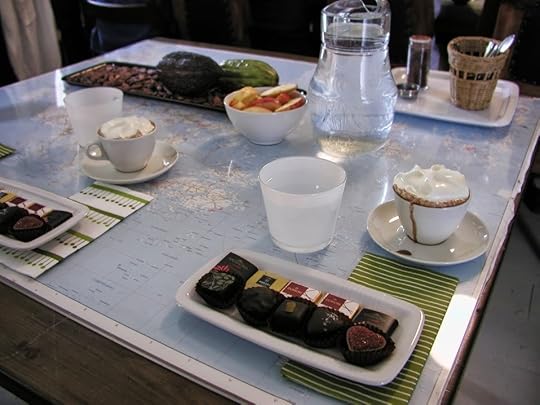
Venezuelan-born Mercedes Urbano-Winquist gave a presentation about how cocoa beans are grown and harvested. This is a fascinating process and in the case of the best chocolate it involves pollination by a particular variety of mosquito found only in South America. She discussed the making and judging of chocolate after export to Switzerland, and then she gave us a tutorial in techniques in chocolate tasting. We also went into her kitchen and she demonstrated how she makes her original praline creations. Steve and I were particularly touched because Mercedes took a lot of trouble to cater to our children throughout the event. She even gave them mobile phones made from chocolate!
There was another bus outing to Kastelholme. About half the group went off to taste wine at a vineyard; Rhiannon was quite put out when she realised she wasn’t allowed to do this. The rest of us crossed the road and wandered round the castle. My sons tried on silly hats.
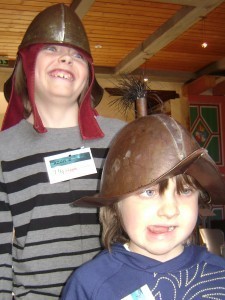
As we were getting back on the bus, a cavalcade of bikers roared into the vineyard car park on some very fine chrome. Some of the guys could have been body doubles for ZZ Top. They were gathering for a charity ride. Just recalling the image makes me smile.
Here is something else that makes me smile:

This is Jukka Halme (photographed by Sari Polvinen). Jukka is living legend in Finnish fandom. He was the master of ceremonies for several events at Åcon, including a game of his own devising where you have to identify SF movie posters from Poland. Jukka has wit and comic delivery second to none. I think he is the funniest man I have ever met (and I met Greg Proops once on a TV set, and also Craig Charles from Red Dwarf, and they could not touch Jukka). I’m told he’s even funnier in Finnish.
For anyone reading this who might be wondering whether to support the Helsinki bid for Worldcon, you need look no further than Jukka. He alone is worth the price of admission. Trust me on this.
I am stopping here for now. Can’t fit it all in one post. I have more to say about Finland and SF, and a few more photos. Coming soon; meanwhile, Finncon is underway and I hope everyone there is having a great time...
June 28, 2013
I know I got my shovel, where's yours?
But here we are again: sexual harassment, SFWA, marginalizing of women writers, the VIDA count…women in genre is the issue of the day. And what is happening at Jo Fletcher Books and with Rod Rees is, in my opinion, nothing more than an attempt to cash in on the outrage and frustration that so many women in this field are feeling. I know I’m bloody feeling it. I feel outraged and horrified about what’s happening in my workplace in the wider context of watching atrocities committed against women worldwide, of watching events in the US unfold that would have seemed unthinkable when I was growing up.
Science fiction is fucked at the moment. As writers we barely glimpse what effects science and technology will have on our lives six months from now, let alone in a thousand years. It has never been more difficult to write science fiction, and never less rewarding as commercial interest shifts increasingly toward other forms of escapist fantasy. But I’m still doing it, shovelling that shit against the tide. And I have a book on submission with Jo Fletcher Books. In the past I would have kept my mouth shut, faced with a post like Rod Rees’, for obvious reasons. But I am at a point where I have seen too many mediocre male writers succeed while my work languishes, unread, that I give no more fucks, flying or otherwise. I have nothing left to lose, you see.
I have had other reasons for staying out of these discussions. One reason is that I can dish it out but I can’t take it. It’s easy to hurt me. I have the world’s thinnest skin. Am I smarter than most of the dudes in this business who sell bigger than I do and shout louder? Yep. Can I write better novels? Damn straight, I can. Could I beat them all up in a fight? Hah, you can bet on it. Do I want to have to succeed by putting other people down or whacking them in the head? No, I do not.
So I have a book on submission at that house, and I ask myself: would I want to be published there if this is what’s happening? But then I ask myself, where would I want to be published that this isn’t happening? And in point of fact, despite being an Arthur C. Clarke Award winner and multiple-time nominee, despite 20 years in this business and accolades by top reviewers and writers such as Ian McDonald, Pat Cadigan, David Brin, Patrick Ness, Justina Robson, Adam Roberts, Peter F. Hamilton and Jon Courtenay Grimwood, I have been struggling to sell work, and because of that I have been struggling to write.
Now, that is no big news. A great many writers are struggling right now. We are legion. But. I am asking myself whether science fiction doesn't deserve all the bad press it gets if it keeps putting its money where its values are.
Is Rod Rees what we want as a field? Shit, we’ve just fucking lost Iain Banks. McAuley and Cadigan have cancer and I hope to God they both beat it. But really, what is the future of the genre in this country when publishers have to resort to cheap tricks like this and when idiots like Rees are encouraged to open their mouths and speak with regard to issues concerning women?
Rod Rees will be down the pub being consoled by his friends that the mean, bitter women have ganged up on him. Me, I will go back to the novel I am writing on spec—this will be the second written on spec in the last few years, because I haven’t sold enough numbers to be offered a contract on a partial—and I will write my heart out, as I always do.
But the trouble is here that the publishing system is in freefall and it’s every man for himself. That means that women support each other and women support men. Why did a woman publisher say to Rees, 'OK, put up that post, we’ll get some hits off that?' Because she is trying to sell books, I'm guessing, and she’s trying to do it any way she can. It’s called survival. Why, when Kari Sperring put up that twitter feed #womentoread, were nearly all of the respondents women? Why did Nina Allan take time away from working on her novel to blog about her top Women To Read while her much more famous partner focused on his own career? Why did the rebuttal against Rees come from Foz Meadows and not one of you blokes?
Where the fuck are you guys? I can count on one hand men who have done anything about this. Niall Harrison. Ian Sales. Um? Anybody else? Oh, Paul Cornell. I guess there must be others but I’m damned if I can call them to mind. Shit, it’s almost as hard to think up these names as it is to think of women SF writers who exist other than Ursula Le Guin and C.J. Cherryh.
What does it fucking take?
Can you tell I’m mad.
PS I’m not linking to anything, you can google if you don’t knowPPS I’m not on twitter anymore but if you are and you want to link to this, feel free.PPS disabling comments because I have a fucking book to write and not sell. Ha ha.
June 24, 2013
where have I been?
I've just finished a very difficult academic year with partial success. I took the applied maths exam, results pending, and deferred the physics exam although I've 'banked' a series of very nice marks for the continuous assessments. I expected the year to be tough and it was, and the fact that my father died halfway through did not make it any easier. I've done virtually no writing since last October and I'm only just now beginning to reconnect with my kids, who have been primarily under Steve's care all this while.
I wanted to say a few words about Twitter. I cancelled my account in the run-up to exams because I found that my feed was too toxic at times. By 'too toxic' I mean, too toxic for me and my extremely limited tolerance for bullshit; this is a personal thing. There were people I was in contact with only on Twitter, and I regret that I have lost those contacts, but it couldn't be helped. Friends had suggested I try using lists to manage what I was reading, but that's too much for me to organize. I like to keep things really really simple.
It's been interesting for me to observe myself thinking about this and making my decisions. For several years, I felt guilty that I was not doing enough to promote my work, that my obligations to babies and young children were interfering with my work, that I couldn't travel, and on and on. I went on Twitter purely because I was advised to do so by friends in the industry. Some things about it were great and some not so great. Every time I would think of leaving some part of me would say, 'No, you're not allowed to do that. You have to be a professional.' It is shocking to me that at the age of 45 I seem to have internalized some notion of what I am and am not allowed to do. Anyone who knew me at 20 would laugh their head off at the very thought. Yet there I was. Asking permission in my own head.
In the end I felt a bit horrified that I was quailing before the 'shoulds' and so I will remain off Twitter for now.
So. I have some things I want to blog about, the first being my recent trip to Sweden and Finland for Åcon 6, where I was lucky enough to be guest of honor. This actually happened in May but it may be early July before I get round to writing it up. These few days were the highlight of the year for me and they rapidly restored my faith in writing and reading SFF, so I want to share with you what it was like. In the course of doing this I will be giving a big shout to the Helsinki in 2015 Worldcon bid.
I should also say that I am on Facebook regularly. I know, Facebook is evil and everything, but it's the place where I can connect with family and old friends, the people I know in real life. It's personal, not professional, and I intend to keep it that way.
I will be writing all summer.
August 13, 2012
what have I done?
So here's the thing. I have no idea how I will handle the demands of all this learning, but I've been working to prepare academically and also in terms of time management. A lot of things are going to have to be adjusted in our household--and in my head--to make this possible. Each course is slated at 16 hours per week but anecdotal evidence suggests that MST209 needs more like 25 hours a week, and I know in my heart that I'm going to find it difficult because maths doesn't come naturally to me. I am mustering all my powers, but my powers are feeling weedy and insignificant just now.
I've come off Twitter. I'm on Facebook mostly because there are course groups there where I can interact with other students.
I feel like I should wave a little flag and say, 'I'm still a writer,' but right now I've got to do this other thing pretty much exclusively. It would have been great if I could have juggled writing with part-time study and raising the family, but it hasn't worked out that way. I hate having to see my writing as an income stream (or not). These studies will eventually get me a job, and then I can go back to my former attitude of who fucking cares what the industrial superfungus wants?
I've still got half an SF novel that...what can I say about it? I think I can safely say it's unlike anything else out there. I want to do it justice.
I'm scared. Did I mention that?
We're just about to leave for the coast for a few days. I'm not taking the computer, so forgive me if any comments go unanswered?
July 17, 2012
learning to learn
I've taken 130 credits with the OU in the last eighteen months. But I'm only now starting to get a grip on how to study. Starting.
It's true that in the beginning I had to juggle a young child at home for at least half the school day, and it was hard to work on anything in the evenings because the house was so loud and everybody was all, 'Mum...?' I couldn't stay awake at night, or get up early in the morning due to aforementioned child climbing in the bed in the middle of the night and refusing to stay asleep unless I was there. OK. The first year was tricky for its own reasons, but the science side of the coursework wasn't very difficult so I half-assed a way through.
The kids are now all in school for six hours, and even when they're home I can usually grab some time without worrying what mischief they're up to. I can stay up late. I get a solid 7 or 8 hours of sleep most nights, which means that by day I'm operating with full faculties. All of this is recent.
And what have I realised? I don't have a clue how to study. I have a Master of Arts in Education, and I managed that while student-teaching more or less full-time and commuting, so it wasn't exactly a walk in the park. I remember doing a lot of reading, writing papers, going to seminars. I think I expected some of the skills and habits I picked up back then to cross over into the work I'm doing now.
They don't. They really don't. Right now I'm trying to get ahead in the big physics course that starts in October. I'm working through the first text, doing all the problems, going online to find some supplementary problems, sometimes watching MIT lectures, and working through old assignments to get really familiar with the principles and their equations. What I'm finding is that I can do this and move on to the next section, and when I come back I've only retained a fraction of what I thought I had understood. So everything has to be gone over again. And sometimes a third time.
I never experienced anything like this in the humanities. Usually I can read something, pick up what I need, work with it, and move on. I might take notes and refer to them, but I never actually had to re-read an entire book or go outside the curriculum materials to understand a concept. What's going on now--and it happens with math, too--is much more about attacking a topic repetitively and from different angles, and it really is burning up a lot of time and energy.
I wonder if it's a processing-speed thing. I'm a fairly fast reader, and writing has always come pretty easily, so maybe I just don't know what hard work feels like because I've never done it (novels are qualitatively different, btw). Maybe I never did a program that was challenging enough to put me on my toes. That makes me sound like such a slacker! (Or is that just part of the typical novelist's job description? Slacker in all other areas. We'll draw a veil over those novelists who are also PhDs, lawyers, doctors, etc so as not to spoil this convenient assertion).
The process of learning how to learn is interesting. I mean, yeah, I'm a little discouraged at how slow my progress can be--I haven't even got into the meat of the subject yet, after all--but mostly it's illuminating and challenging to be stretched like this and feel unequal to the task. It's fun to try out different approaches and see what works best.
We'll see how long I think it's fun before I actually keel over...
July 5, 2012
it's harder to hit a moving target?
I had this stupid idea in my head that I was having the summer off to work on the SF novel.
You wouldn't know that to look at the inside of my moleskine. There's just far too much going on every day for my comfort. It is all important, vital stuff. But it results in a lack of staring time, and I need my staring time.
Still, I press on. I did one more pass on Shadowboxer because I'd had a sudden insight about the plot that I should have seen about two years ago, but I can be slow like that. This draft is now going out to some beta-readers for help with culture. I'm apprehensive about the scope of changes I may have to make, but this is my absolute favourite of all the novels I've written so far. I never could have hung in there like this if I didn't love it like a furry animal.
Depending on how my exam results turn out, I may have a full-time university course load this year. I'm trying to get ahead in case this happens. It means most of my online/e-mail time is getting redirected ruthlessly to the moleskine list.
Listen to me. I sound so focused. This can't be good.
June 29, 2012
when autobiography turns bad & shows your cottage-cheesy ass
This is the third in my series of posts about my e-book backlist from Orbit.
Double Vision and Sound Mind were experiments in autobiography using a cross-sectional view that addressed the more abstract undercurrents of what so-called ‘normal life.’
To a certain extent I used autobiography in these books in the same way I would have used found sound in composing music. I took pieces of my own life and dropped them as chunks into the SFnal narrative, observing the way they interacted with their new environment. (You could argue that all stories are built this way to some extent, and I wouldn’t disagree; but with these books I was intentionally cultivating this.) I made certain alterations to the autobiography so that I could work it into the story, but I stayed as close to my own personal recollection as I could. In this way I created parameters for my fictional experiment.
One of the problems with this approach lay in the loaded racial content I was working with, including massive environmental racism. It was in the air everywhere when I was growing up, and coupled with it there was an utter denial that it even existed. This fucked-upedness found its way into my fiction in various ways.
There is an episode where one of the minor characters in Double Vision has a dodgy sexual encounter with an Okinawan karate master who she naively believes is taking her aside out of interest in her martial arts ability. Something very similar actually happened to me when I was sixteen on a trip to Okinawa and Japan. In the novel some details are altered and some aspects are exaggerated, but the gist of it is out of my life and I lifted a good bit of the dialogue straight out of things that were actually said.
And here’s where the question comes: can you just drop stuff out of your life into a story and expect it to work as story? Well, in this case, not so much. Certainly as a white writer portraying non-white characters, I might have thought through the implications of what I was putting on the page much more carefully. When I read Requires Hate’s review where she quoted some of these passages, the bottom of my stomach dropped out. There were a lot of angles I hadn’t considered. I ended up parroting the racism of that time and place when I might have been unpacking it instead.
Guess what? I didn't see what I was doing. I'm not very happy with myself, because I should have seen it.
I was working out my personal issues with karate on the page. I had been with a group of Americans travelling to Okinawa to train, and while we were there I learned a little about the American presence on the island. It was only years later that I began to hear of the abusive behaviour of US soldiers toward the Okinawans—especially the women. But I didn’t think this through when I was writing. I’m ashamed of the fact that when I flipped the roles around in Double Vision and made the Okinawan masters visitors to the US (which I did for storytelling convenience) I completely failed to see the ways in which I was reversing the more typical scenario of US male sexual assault upon Okinawan females. I couldn’t see it at the time. I was too busy trying to deal with the way it felt to write about what had happened—the karate side of things more than the sexual side, to be honest—and so I didn’t look at the material properly.
The reviewer also flagged up a character’s use of the word ‘robotic’ in connection with karate. This is something where I think I can offer some partial explanation. I will show you three clips of Japanese martial arts so you can see what I’m talking about. This is judo: http://www.youtube.com/watch?v=SgVoMD1RhYg
And you can see it’s free, natural movement which displays technical facility as well as athleticism. And this is sumo: http://www.youtube.com/watch?v=G72bQBMZmzs
Again: tremendous physical expression and use of the body for a deliberate purpose, to get the opponent out of the ring. Now by contrast this is karate, and here is what I meant by robotic, because the style of movement is unnatural and contrived. The better you are at karate, the more controlled and unreal your movement: http://www.youtube.com/watch?v=Ky0tumrBK4w
It never occurred to me that in this choice of phrase I was playing into a slur against Japan associated with its technical industry, because there are lots of Japanese martial arts that are not robotic at all. When I read the passage in question I’m more embarrassed about the height thing and the broken English. I’m not even sure what I was trying to do with weight and food in that book. I honestly don’t even know. I will say that I’m working on my blind spots and my ignorance, and I expect to be doing so for the rest of my life.
The power gradients in the world flow in favour of white Americans getting to say whatever we want about anybody, not just in a freedom of speech kind of way but in a go-to-the-bank-and-collect-lots-of-money-and-also-prizes kind of way. We often receive praise and money for what we write about other cultures even when it is misrepresentative and hurtful. This kind of entitlement is something that I think many of us (especially white) USians take for granted, so that we are shocked and horrified when it is challenged even in a small way.
In her thesis Technology and the Vulnerable Body in Feminist Post Cyberpunk SF Kathryn Allen pointed out a racial approach in Maul that I doubt I would use so blithely now. I used racial stereotypes like they were candy; I exaggerated everything I could find. When Maul works, one of the reasons it works is because I took the crappiest of crap that was in my head and let it come out in ways that were sometimes intentionally ugly.
The self-hate that Sun expresses in the book was intended as the kind of adolescent self-loathing and cynicism that I recognised in myself. But I am a white member of the dominant culture and Sun comes from a mixed background with more than one cultural allegiance. I was wrong to think I could just get into her head and substitute my experience for hers as if our perspectives were somehow interchangeable. And so, unlike my own white girl everything-sucks-in-a-generic-way mindset, Sun’s attitudes read as racial self-hate. Which is really squicky coming from me as a white author. At times I mangled Sun’s viewpoint because I was too quick to assume I knew how she would react; I don’t. Some of Maul is cringe-making to read, now, and I don’t attempt to excuse it. There are things I messed up about the non-binary nature of gender for sure. Gender-wise, I did what research I could with the resources I had, but the fact is I was in way over my head in more ways than I can count.
Similarly, writing about Cookie as a black woman—and a woman of size-- was a risk that I probably would not undertake quite so readily were I writing the book today. I went charging in with an entitled attitude: isn't it cool that I'm writing about people who aren't white and including them in my work? I was a little uncomfortable, a little bit conscious that I might be trespassing. But it didn't really hit home with me that I'd taken liberties--that what I was doing might be unwelcome by members of the groups I was writing about--until RaceFail.
I didn’t have beta-readers to help me with Cookie. I didn’t have Nisi Shawl’s and Cynthia Ward’s book Writing the Other, nor access to the wide range of online discussion now available for writers working cross-culturally. Because of my isolated circumstances, I didn’t have real people to talk to, either.
I did have a sincere desire to make Cookie a kind of hero—but most of my working material ended up coming from the weakest parts of myself. For my own reasons, I needed to work with those foibles and failings, and maybe by doing that in the context of a black character I created a negative impression of what it is to be a black woman—or for that matter a large woman—in America. That kind of association was never my intention.
As Cookie develops, she becomes more self-assured and she ends up as a mythic figure who assumes power in the symbolic world. But I was never sure if I did the right thing by her in the end. I couldn’t quite work it out. The truth is, when I was writing the books I didn’t have an answer for what might be possible for a being like Cookie, in this world or any other. Her eventual fate was more of a note scrawled on a Post-It sticker rather than a definitive statement carved in the stone of story. Knowing her spiritual trajectory, I doubt she would stay where she found herself at the end of Sound Mind.
I've been turning these issues over in my mind for a good few years now. The e-books coming out seemed like as good a time as any to set down a few words on the subject. Maybe this post comes across like I’m just trying to cover my ass. I’m sure that on some level that’s what I’m doing, because I don’t get a do-over with regard to the way I handled race and gender in these instances.
Sincerely, I need to get this out there and be honest about it. I was paid to write these books and I’ve received a certain amount of praise and attention for them, and I think it’s only fair to say that there were places where I messed up. Mea culpa.
Tricia Sullivan's Blog
- Tricia Sullivan's profile
- 75 followers


